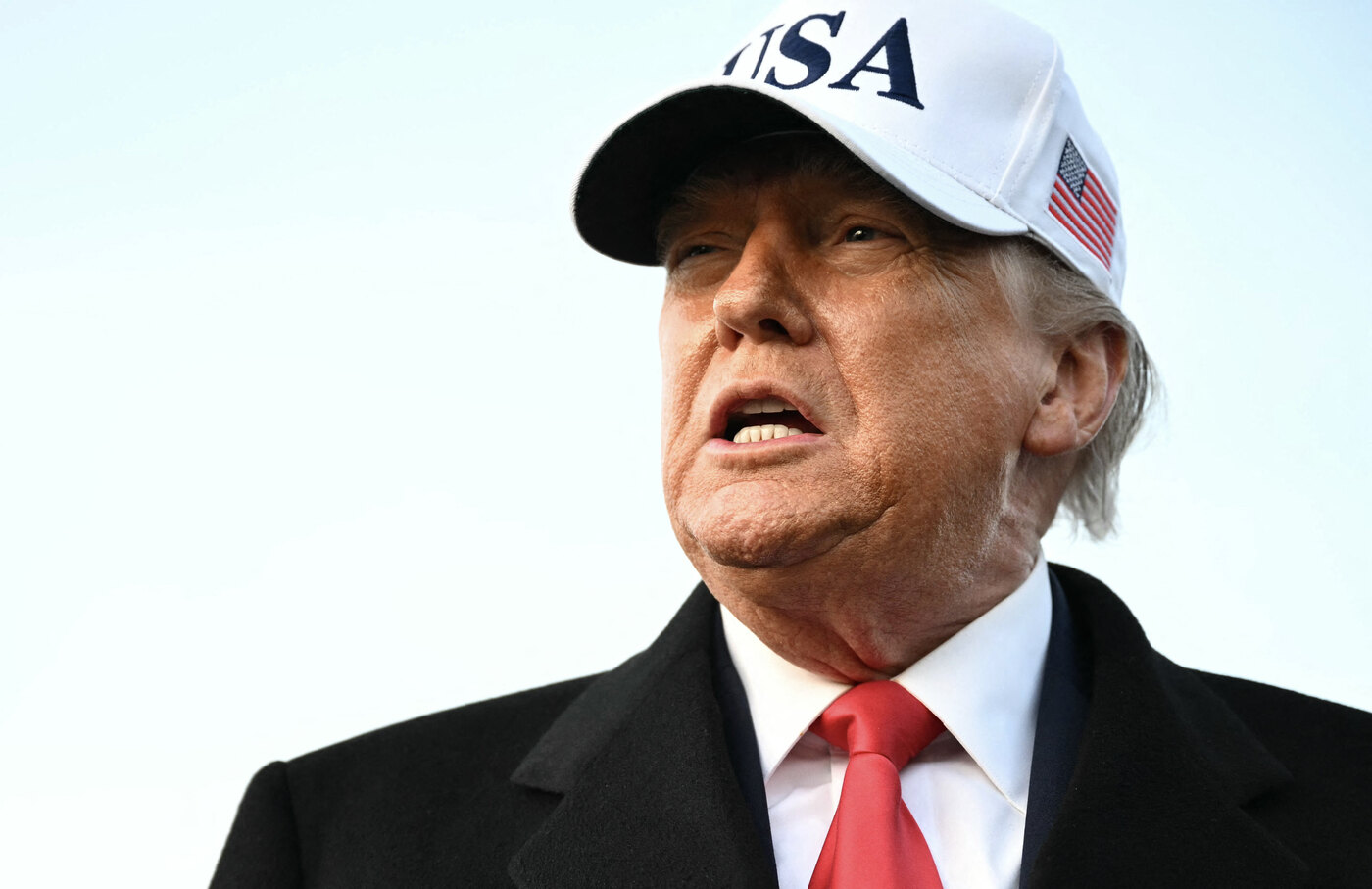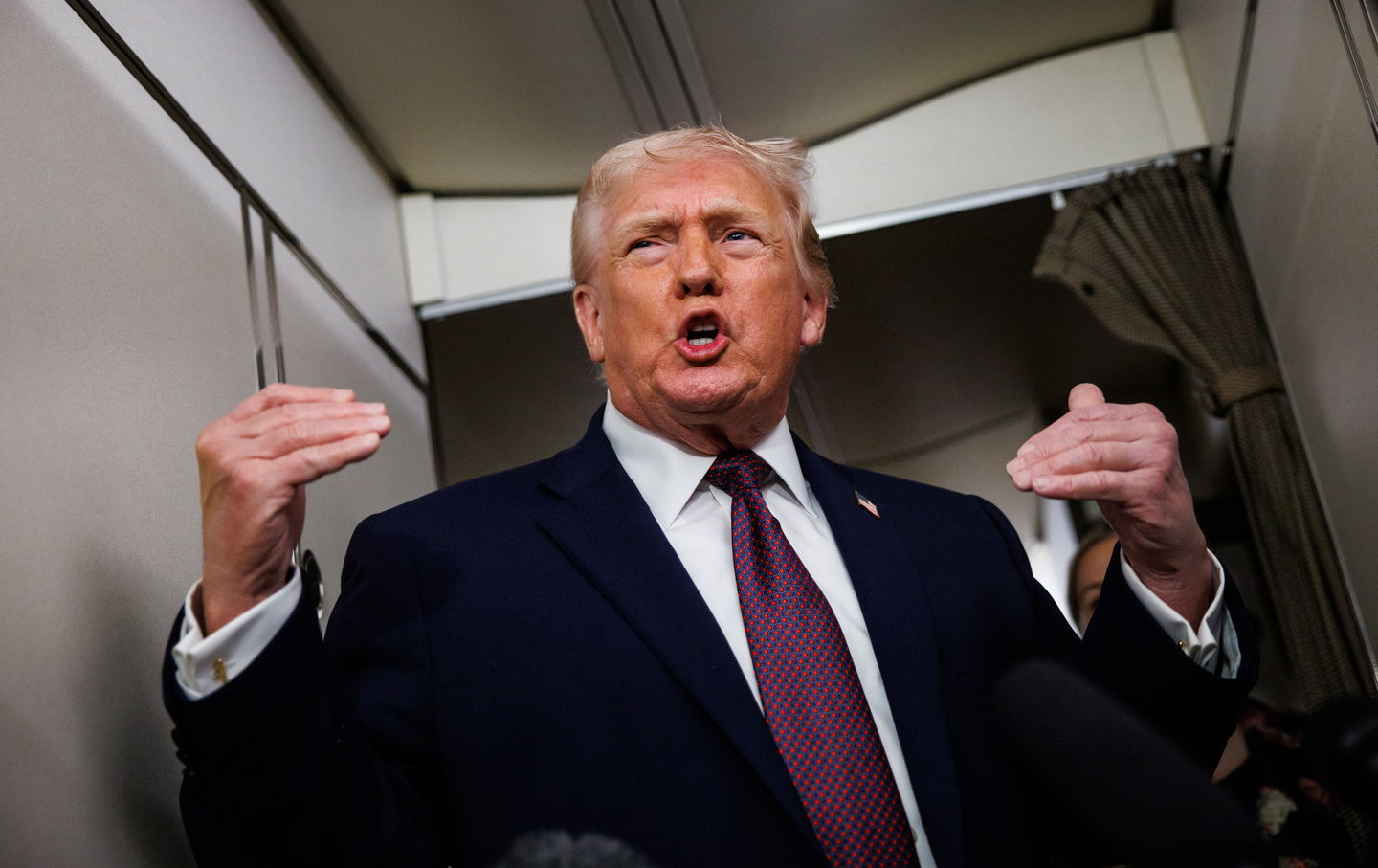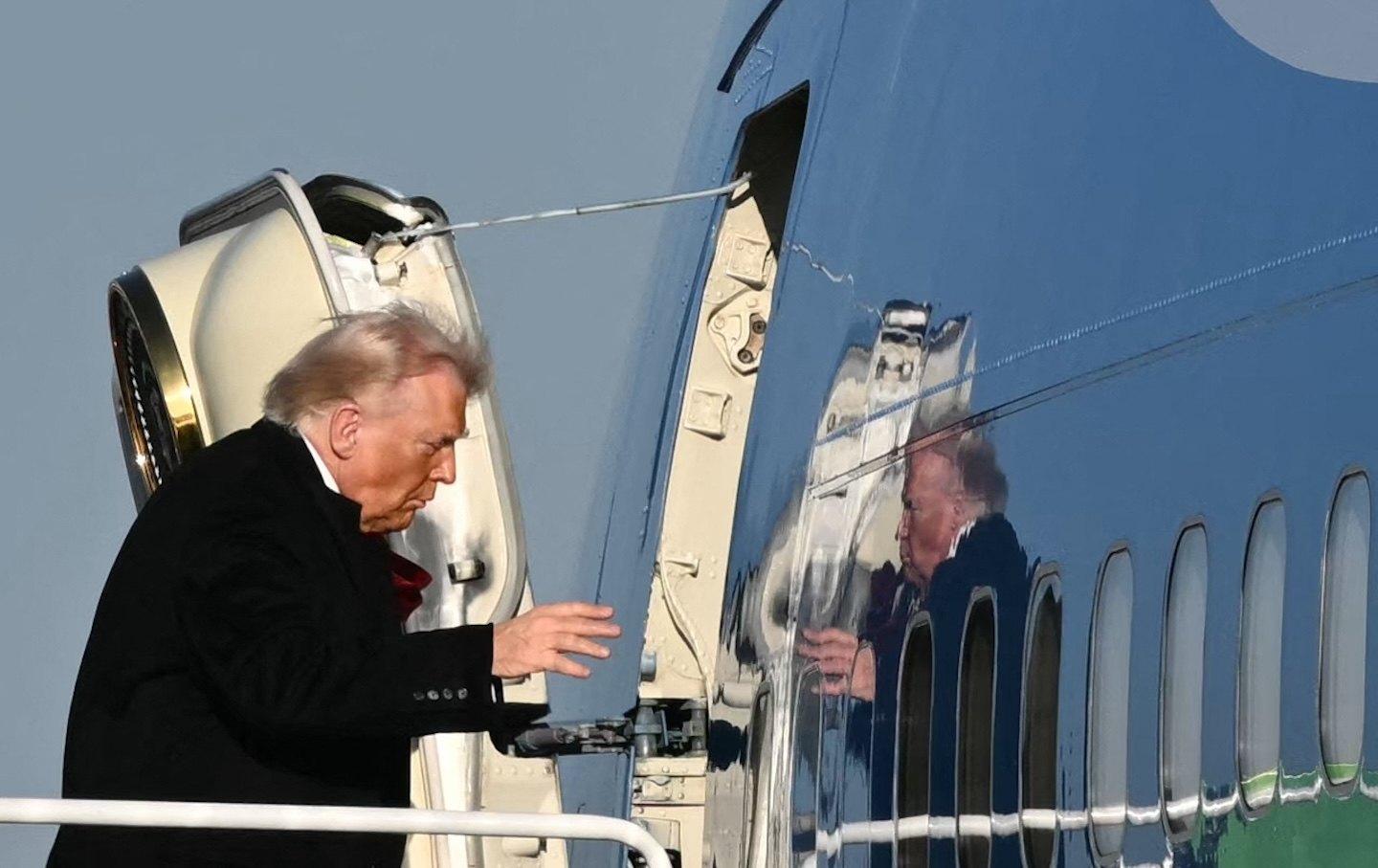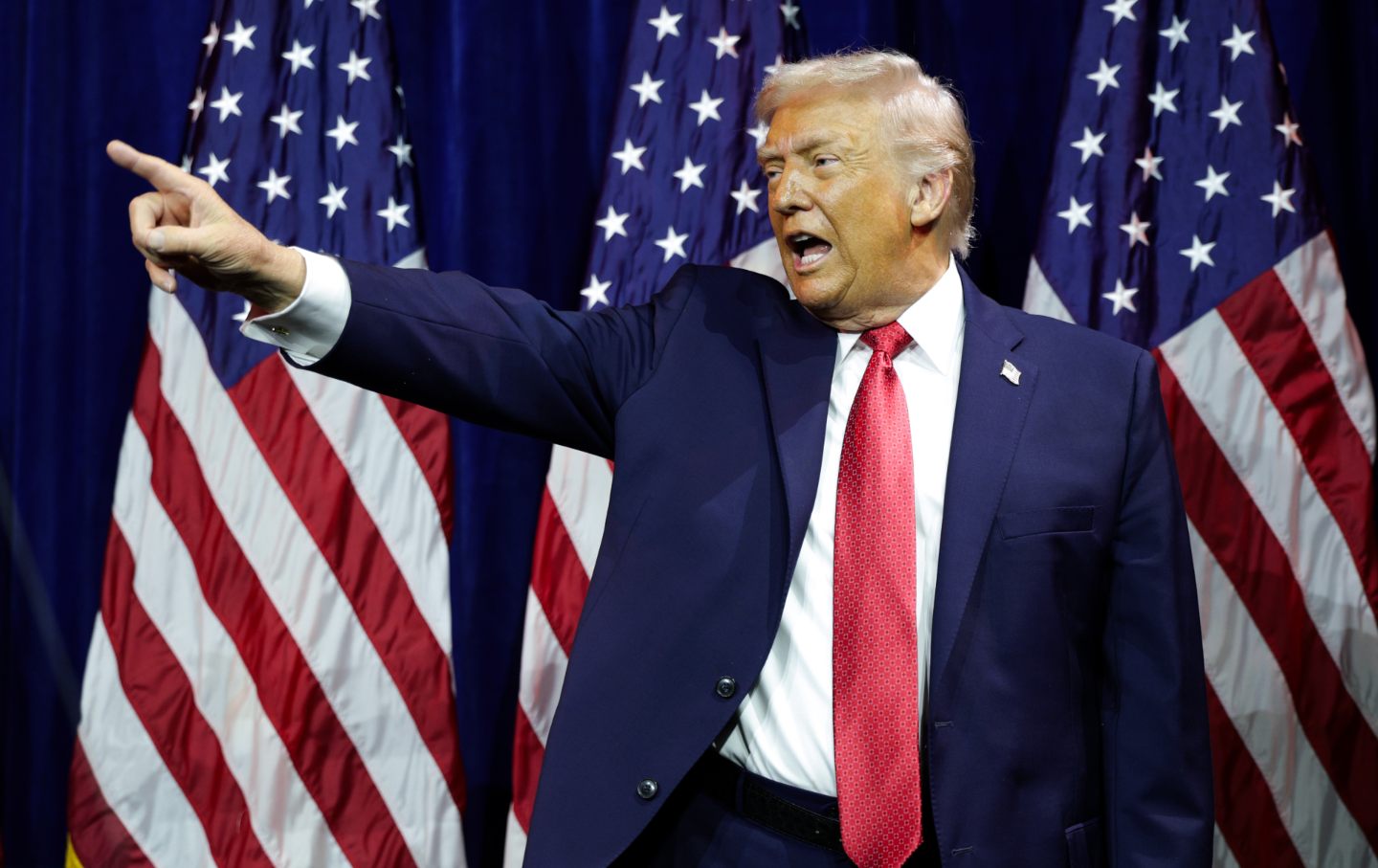Elon Musk’s First Political Contributions of 2025—and the History of Culture Wars
On this episode of Start Making Sense, John Nichols reports on the upcoming Wisconsin Supreme Court election, and Adam Hochschild looks at the Scopes Trial of 1925 and its echoes today.

Here's where to find podcasts from The Nation. Political talk without the boring parts, featuring the writers, activists and artists who shape the news, from a progressive perspective.
The first big election of 2025 will be in Wisconsin, which elects a new Supreme Court Justice on April 1. Elon Musk is spending hundreds of millions in that race. That’s both a threat, and an opportunity for Democrats. On this episode of Start Making Sense, John Nichols will comment.
Also: How did we end up with Trump back in the White House? We got here in part because Republicans built a movement over several decades centered on what are called “the culture wars.” But there’s a long history behind the culture wars, going back at least a century to the Scopes Trial, in 1925, about teaching evolution. It’s still an issue today. Adam Hochschild is on the show to explain.
Advertising Inquiries: https://redcircle.com/brands
Privacy & Opt-Out: https://redcircle.com/privacy
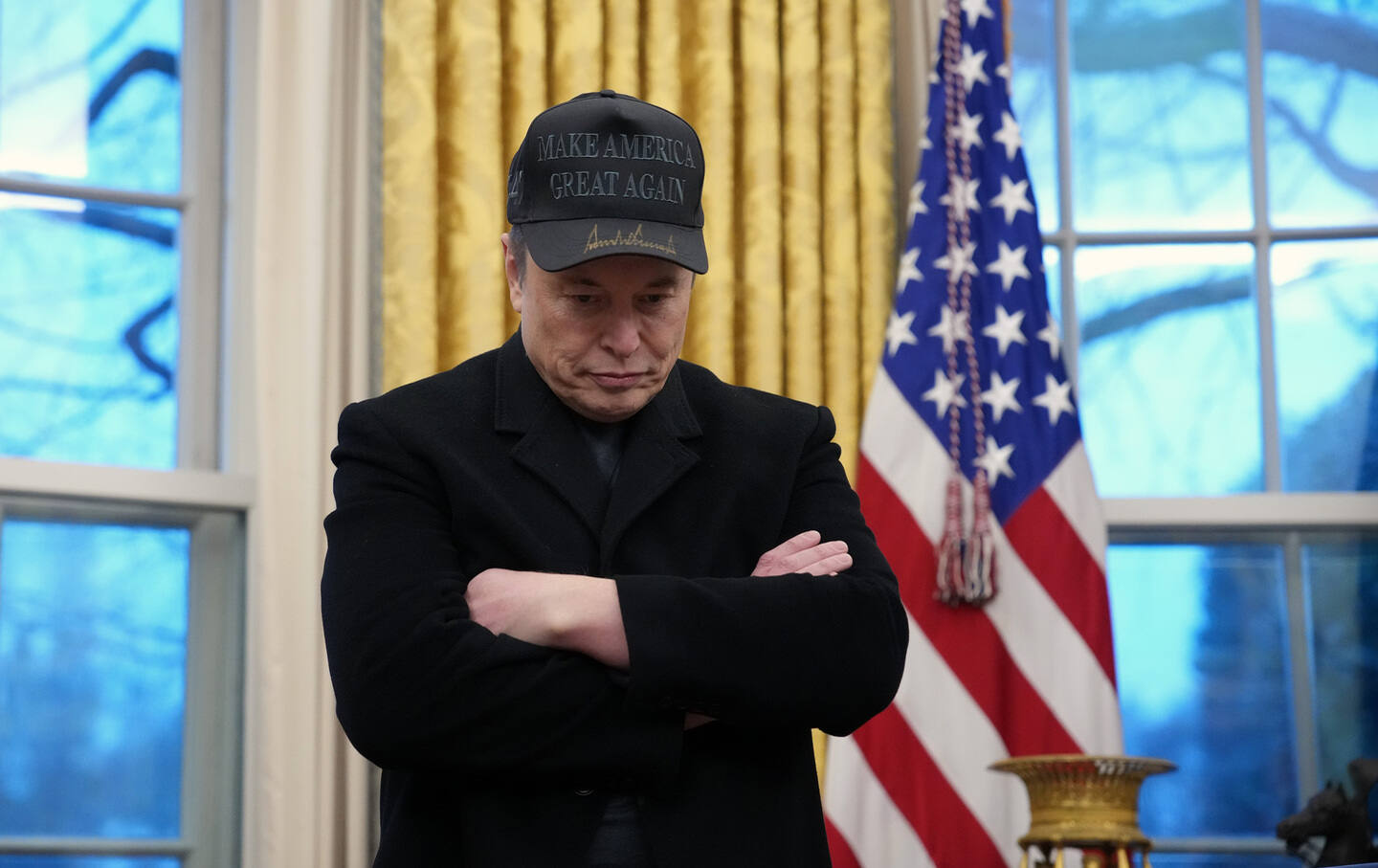
Tesla and SpaceX CEO Elon Musk joins President Donald Trump during an executive order signing in the Oval Office at the White House on February 11, 2025, in Washington, DC.
(Andrew Harnik / Getty Images)The first big election of 2025 will be in Wisconsin, which elects a new Supreme Court Justice on April 1. Elon Musk is spending hundreds of millions in that race. That’s both a threat, and an opportunity for Democrats. On this episode of Start Making Sense, John Nichols will comment.
Also: How did we end up with Trump back in the White House? We got here in part because Republicans built a movement over several decades centered on what are called “the culture wars.” But there’s a long history behind the culture wars, going back at least a century to the Scopes Trial, in 1925, about teaching evolution. It’s still an issue today. Adam Hochschild is on the show to explain.

Here's where to find podcasts from The Nation. Political talk without the boring parts, featuring the writers, activists and artists who shape the news, from a progressive perspective.
As Trump’s support collapses, he has lashed out in two directions–sending an unprecendented number of ICE agents to Minneapolis, where one of them murdered Renee Good, and sending the military to Venezuela, where he says he has seized control of the oil industry. Harold Meyerson comments.
Also: Twenty Minutes Without Trump: There’s a new TV series about how capitalism came to Communist China, 30 episodes made for Chinese TV by the great Hong Kong director Wong Kar Wai, running now on the Criterion Channel. John Powers, critic-at-large on Fresh Air with Terry Gross, explains.
Advertising Inquiries: https://redcircle.com/brands
Privacy & Opt-Out: https://redcircle.com/privacy
Jon Wiener: From The Nation magazine, this is Start Making Sense. I’m Jon Wiener. How did we end up with Trump back in the White House? We got here in part because Republicans built a movement over several decades centered on what we call “the culture wars.” But there’s a long history behind the culture wars, going back at least a century. In many ways the most dramatic battle of the culture wars was almost exactly a hundred years ago – in 1925, the Scopes Trial, about teaching evolution. It’s still an issue today. Adam Hochschild will explain.
But first: the first big election of 2025 will be in Wisconsin, which elects a new Supreme Court Justice on April 1– and Elon Musk is spending hundreds of millons in that race. John Nichols will comment, in a minute.
[BREAK]
The first big election of 2025 is already upon us, and Elon Musk is putting big money behind the Republican-backed candidate. We’re talking here about the Wisconsin State Supreme Court election coming up on April 1st – in just what, six weeks? For that story we turn to John Nichols. Of course, he’s national affairs correspondent for The Nation. We reached him today at home in Madison. John, welcome back.
John Nichols: It’s good to be with you, Jon. It’s about 20 below zero wind chill here.
JW: Oh man.
JN: Very robust Wisconsin political day.
JW: Wisconsin will elect a new state Supreme Court justice on April 1st. Liberals won a one seat majority on the state Supreme Court there in 2023 in a historic shift of power. Now, another seat will be on the ballot to replace another liberal. So once again, the political balance of the Wisconsin Supreme Court is in the hands of voters. For starters, remind us about that 2023 election. We all had to learn how to pronounce the name of the woman who won, Janet Protasiewicz. Did I get that right?
JN: You got it exactly right, Jon. And that tells you everything about the significance of Wisconsin on the national political map, because people in L.A. know how to say Protasiewicz. And the 2023 race was a very, very big deal. It was in many ways, one of the great tests of the changing politics of Wisconsin. In 2010, Wisconsin became sort of the petri dish for right-wing politics in America. Scott Walker became governor and he had controlled the legislature. He launched a huge anti-labor initiative, but also assaulted voting rights, women’s rights, so everything. This was a very, very right-wing period in Wisconsin. And on everything he did, he was backed up by a right-wing Supreme Court. And the Supreme Court in Wisconsin remained under essentially right-wing control throughout the Walker era, but then after Walker was defeated for reelection. And as a result, it was very, very hard to do all sorts of things that the voters of Wisconsin actually wanted and had confirmed by their votes in elections, and not just electing Democratic Governor Tony Evers, but reelecting him.
In 2023, you had this contest for an open seat on the state Supreme Court, and it was a conservative held seat. And what happened was that huge amount of energy went into the race. It was very, very expensive. Janet Protasiewicz, a judge from the Milwaukee area, was elected to the court. That shifted the court from a 4-3 conservative majority to a 4-3 progressive majority. Now, one of the members of that progressive majority, Ann Walsh Bradley, the senior member of the court, very respected jurist, is standing down. She’s not running for reelection after many decades on the court. That creates an open seat race, and you can do the math. If this progressive seat were to flip to the conservatives, conservatives would regain their 4-3 majority. Why that’s a big deal is because Wisconsin Supreme Court deals with abortion rights, voting rights, labor rights, the whole panoply of issues. It’s very, very powerful in this closely divided state. It’s also very, very influential as regards presidential politics in a state where five of the last seven presidential elections have been decided by under 30,000 votes.
JW: Please explain to us, after the 2023 victory of the liberals gaining a majority on the Supreme Court, what was the effect of this on politics in Wisconsin?
JN: Look, this is a closely divided state. Trump won Wisconsin in 2024 by a very tiny number of votes, but he won it. Tammy Baldwin was reelected to the Senate, very liberal senator reelected to the Senate. So it’s so divided. You can go both ways. But the critical shift in the politics of Wisconsin was as regards to state legislature, because the Supreme Court took up the issue of gerrymandering, the rigging of the maps of the state legislature, which had tremendously favored Republicans. Their intervention was so serious that the legislature jumped in and agreed with Governor Tony Evers on a compromise that gave the state fair maps, not Democratic leaning or Republican, just fair maps.
And what did fair maps do in Wisconsin? The Democrats picked up, I think, 10 seats in the state assembly, four seats in the state Senate, and are by all accounts on track to very possibly win majorities in both chambers in 2026. This is why conservatives are so excited, so energized to get the court back because they want to get back to this world that favored them of rigged maps, of limits on voting rights, all sorts of things like that because Wisconsin has always been competitive, but at least in state politics, it has shown some pattern of going toward the Democrats and control of the court is very, very critical to how fair the elections are and by extension from that, how competitive the Democrats are.
JW: In this year’s election, April 1st, the liberal candidate is Susan Crawford, a county judge. The Republicans are running the former State Attorney General, a guy named Brad Schimel. And we just learned this week that Elon Musk is putting big money behind the Republican candidate. Elon Musk’s dark money group called Building America’s Future has been buying TV time in Wisconsin. We learned that something like $670,000 of airtime for the next two weeks on TV stations throughout the state has been bought by Elon Musk’s dark money group. They will run ads through March 5th. You think Elon Musk will call it quits after March 5th?
JN: I do not think so. Look, former Governor Scott Walker, who we mentioned a minute ago, has been working overtime to try and nationalize this race, to try and get a lot of big out-of-state money to come in. Now, I’m not going to lie to you, Jon. There’s out-of-state money on the Democratic side as well. Look, you should understand these Wisconsin court races have become hyper nationalized even though it’s officially a nonpartisan race. The big win for the right, of course, is to get Musk in because Musk has been an incredibly free spending player in our politics, something in the range of a quarter billion dollars put behind Trump’s campaign in 2024, a lot of money in other campaigns. And remember, Musk has now played this very interesting role of intimidating the Republican Party, telling senators basically, signaling that if you don’t vote with the Trump agenda, you’ll be primaried or potentially face some political risk.
And he’s in for really what in the scheme of Wisconsin Supreme Court races is not a large amount of money, $670,000 in races where you’re talking about tens of millions being spent is not, but the assumption is that this is just the beginning. Another billionaire, Richard Uihlein, has a political action committee that is in majorly for something like $1.3 million at this point, and it’s assumed that that will extend as well. So what you’re really talking about here is a massive inflow of right-wing money, and obviously if indeed this Musk aligned pack turns on the spigots, that could have a very profound effect in Wisconsin politics.
JW: So the Republican candidate, Brad Schimel, has been elected to statewide office twice. His opponent has been elected as a county judge. Isn’t that a high bar for the candidate backed by the Democrats?
JN: Wisconsin politics is so divided at this point and so intense. I don’t think you can communicate it to people who don’t live in Wisconsin. We’re on kind of a permanent political cycle. The ads barely stop from one election before they start for the next, and so you have a hyper-informed electorate. I don’t think that Schimel particularly benefits by the fact that he ran statewide a decade ago. Last election that Schimel won was in 2014. He got beat in 2018. No, I don’t think he’s overly benefited by that. I think the key thing in the spring election cycle is that we tend to have obviously somewhat lower turnout than in presidential. There tends to be a drop-off in Republican participation, conservative participation. A lot of the big donors, what they’re hoping for is not to swing voters, but rather to mobilize voters.
Now, on the flip of this, you have Ben Wikler, the chairman of the Democratic Party in Wisconsin, who’s been kind of brilliant at voter mobilization on the Democratic and the liberal side. So that’s what you’re seeing here, what Wikler has done over a number of years, which has made the Democrats much stronger with this real deep grassroots mobilization strategy that gets Democratic and progressive voters out. Spring elections, fall elections, they come. There’s an underperformance on the Republican side, and I think what you’re looking at here is an effort by some national billionaires to address that with a massive inflow of money. I don’t know that it’s going to work. It’s such a closely divided battleground state that any intervention from in-state or from outside can have a profound impact.
JW: These millions that are pouring into Wisconsin from both sides are mostly spent on TV ads. I am not really convinced that TV ads change anybody’s votes. I wonder what you think about this.
JN: Yeah, it’s very obvious that TV advertising is really today basically a voter suppression tool. You flood the airwaves with negative ads about somebody in the hopes that their voters will just decide to stay home. It’s a horrible system. The structure is awful. The intervention against that has been the Wikler strategy in Wisconsin, which has been to go massively into that grassroots, literally building up the county parties, building up grassroots organizations across the state, not just within the Democratic Party, but in a broader sense so that people actually go knock on doors, talk to their neighbors. That’s a very significant counterbalance to it. As exhausted as a lot of people are with politics, I think you’ll see a major mobilization at the grassroots. That’s somewhat of a counterbalance to the TV. I think there’s no question that in 2024, that grassroots effort was absolutely critical to getting Tammy Baldwin reelected to the U.S. Senate and also frankly, getting massive increase in the number of Democratic state legislators.
JW: I want to end here on Elon Musk. Of course, his unlimited money poses a major threat, not just in Wisconsin, but all over the place. But there’s also kind of an opportunity with Elon Musk entering the race to liberals, which is that Elon Musk is not popular in America. There’s a new Economist YouGov poll last week found that independents disapproved of Musk’s handling of the so-called Department of Government Efficiency by 18 points. Only 31% of independents approve of what Elon Musk is doing, and the survey also found that self-described moderates disapproved of Musk by even more, 21 points. Only 33% of moderates said they approved of what Musk was doing with DOGE. I imagine Democratic campaign strategists in Wisconsin have noticed this.
JN: Oh my goodness. In fact, the immediate statements about the race where Elon Musk is doing this in Washington, now he wants to do it in Wisconsin. I think Trump will ultimately realize that being closely associated with Musk is not necessarily to his benefit, but he hasn’t yet. The danger for Republicans and conservatives in this case, again, officially a nonpartisan race in Wisconsin, the danger for them is that in a nationalized race, they’re stuck with Elon Musk. While Donald Trump, like him or dislike him, has people who are enthusiastic about him, there’s limited evidence that Musk has that same appeal.
So in a race where there’s a lot of talk about Elon Musk, and more significantly a lot of talk about billionaires and billionaire power, oligarchy, this incredible influence on our politics by the wealthiest people in the world, if the race becomes about that, then I think there is potential damage to the conservative cause there. In watching special elections and local elections across the country just since January 20th, there has been a real pattern of Democrats and progressives doing quite well. It’s too early to say, ‘Oh yeah, it’s going to go one way — or the other.’ But I do think that there is evidence that running against Elon Musk, and, frankly, running against what’s happening in D.C. may get some traction.
JW: John Nichols — read him at thenation.com. John, thanks for talking with us today.
JN: It’s a pleasure to be with you, Jon. Come on out from L.A. anytime to this cool climate.
[BREAK]
Jon Wiener: How did we get here, with Trump Back in the White House? Trump did not campaign promising an immediate cut in federal funding for school lunches, head start childcare, student loans, food stamps, or Medicaid, which provides healthcare to 82 million Americans. Even though he began his second term by announcing he was ordering what he called a pause of indefinite length on $3 trillion in federal grants that fund all of those programs. Then after a barrage of lawsuits, the courts ordered him to abandon the funding freeze. But the word this week is that some funds are still not being released, but that’s not why more people voted for Trump than for Kamala Harris. We got here because Republicans built a movement over several decades centered on what we call the culture wars. Recently it’s centered on abortion rights, but there’s a long history behind the culture wars going back at least a century.
In many ways, the most dramatic battle of the culture wars was almost exactly a hundred years ago, in 1925: the Scopes trial. For comment on that history, we turn to Adam Hochschild. He’s an award-winning author –we’ve often talked with him about his books here. My favorite is Bury the Chains, about how a small group of people started the movement that ended slavery in the British Empire and eventually everywhere. His most recent book is American Midnight, The Great War, A Violent Peace, and Democracy’s Forgotten Crisis. He’s a contributor to The New York Review where he wrote recently about the Scopes trial, and about the new book on the trial by Brenda Wineapple called Keeping the Faith. We reached him today in Berkeley. Adam Hochschild, welcome back.
Adam Hochschild: Thank you, Jon. Always good to be with you.
JW: 1925 – let’s set the scene. The Klan was at its peak of nationwide popularity, with chapters in all 48 states and millions of members. A powerful anti-immigrant movement had succeeded in getting Congress to ban all immigration in 1924, except from Northern European countries. And some states in the south started passing laws about the science curriculum in public schools, Tennessee for one,
AH: Right. This is what is chronicled in Brenda Wineapple’s fine new book, which I strongly recommend, called Keeping the Faith. What happened was Tennessee passed a law that essentially forbade the teaching of the theory of evolution in schools. Paradoxically, the state-approved biology textbook for the state included the theory of evolution. Various people were eager to make a test of this law in Tennessee because there were similar laws in process or coming down the pike in other states in the south. A young teacher named John Scopes, who while working as a substitute teacher, had taught the theory of evolution from the state approved textbook, and he agreed to be the subject of this test case. One thing that I learned from Brenda Wineapple’s book was that there were other motives for making this a test case. And the city fathers in Dayton, Tennessee knew that if there was a trial on this subject, they would become the center of national attention.
They would attract press from all over the country. It would be on the front pages of newspapers everywhere, and it would bring a lot of business to the town, and indeed it did. These were the days of fully staffed newspapers, and they sent more than 150 reporters and columnists to the town. It was the beginning of radio news. And they planted a microphone by the witness stand in the courtroom so as the trial took place, people all over the country could hear what was being said. This was one of the first times something like that had been done. And of course, what really put the trial on the front pages was the lawyers on each side defending Scopes in his right to teach from this state approved textbook about the theory of evolution was Clarence Darrow, who was famous for defending all kinds of underdogs.
This had been his whole career defending labor union representatives, defending radicals of all kinds, defending criminal defendants in cases where he wanted to test the death penalty. The volunteer prosecutor was a sometime friend of Darrow’s, William Bryan, three times a candidate for president, had been Woodrow Wilson’s Secretary of State, and he was deeply religious fundamentalist Christian, and he to volunteered to prosecute Scopes. Darrow and Bryan had known each other, and Darrow had actually supported Bryan in two of his campaigns. Because despite taking the conservative side in this case, Bryan was quite a decent man who had been something of a progressive for much of his political life, not on race issues, but on all sorts of other things, child labor regulating business, fair deal for farmers and much more.
So, here we have two nationally known figures. If there was a test case today in Florida, for example, about all of the many things that are now forbidden there, like teaching about climate change, for example–and on the side of the defense, you had, say, Rachel Maddow, and Donald Trump doing the prosecution. You’d have to grant each of them temporary law degrees, but it was that level of celebrity, and that’s what attracted all the newspaper reporters and movie cameramen and so forth to Dayton to cover this trial.
JW: So, this was then a debate over Darwin’s theory of evolution versus the story of creation as told in Genesis, the first book of the Bible. What was the trial like?
AH: Well, it took an unusual twist, which was this: Darrow had brought in a panel of eminent scientists to testify about the scientific basis of the theory of evolution. The judge allowed only one of them to testify, and fairly briefly, the others couldn’t appear. So, then Darrow asked to examine a knowledgeable witness about what the Bible said about the creation of the world. And that witness was none other than his opponent in the courtroom, William Jennings Bryan, who rose to the bait. He couldn’t very well say ‘No’. And of course, anybody trying to defend the Bible as literal truth runs into problems very quickly, because it’s filled with contradictions and things are said metaphorically. If you want to take them literally. you get into trouble. So, Darrow asked him, “How could the world be created in six days when God didn’t get around to creating the sun until I think it was the third day. How were the days measured before then?” And he sort of forced Bryan to admit that, “Well, maybe the days were longer than a day. Maybe there were millions of years,” so on. So, Bryan got himself all tangled up.
JW: And you say race was the issue lurking behind this fight over Darwin versus the Bible. How so?
AH: I think race came into it at this time because Black people were often contemptuously referred to as monkeys still up in the trees in Africa and so forth. And so the idea that we were all descended from monkeys in one way or another was deeply upsetting to quite a few conservative Christians, because it made them closer to Black people. The idea that we all had a common ancestor instead of, as the Bible says, the children of Ham were created separately by God after the rest of us who of course were, in the conservative view, were all white were created. So, race was lingering there in the background, although it wasn’t really explicitly talked about in the trial.
JW: And how did the trial end? Innocent or guilty?
AH: Guilty, which everybody expected, because the law was very clear that you can’t teach the theory of evolution in the Tennessee school. And Scopes had done so.
JW: Today, the defense would appeal this guilty verdict and claim freedom of speech or something like that and try to get it before the Supreme Court. How come that didn’t happen in 1925?
AH: I think because they thought that the law was so clear.
JW: And I think also because the Supreme Court had a very literal understanding of the prohibition in the Constitution against the establishment of a national religion. If Tennessee had said, ‘The teaching of evolution is banned because Christianity is the official religion of the state of Tennessee,’ that could have been declared unconstitutional. But they didn’t claim that. And so the Supreme Court, it was understood at the time, I believe would’ve ruled that the state has a right to do this. It was within the state’s powers.
AH: Yeah, that makes sense.
JW: And you see, there was a deeper structure to this debate that it had deeper roots in the social divisions in America and not just between Black and white.
AH: At many times in our history, and it’s certainly true today, and we can come back to that, but it was also true in the first couple of decades of this century, the country was undergoing enormous changes 100, 120 years ago. One of the big changes was the population was shifting from the countryside to the cities in huge numbers. Farming was becoming mechanized. There were tractors, mechanical harvesters and so forth, which reduced dramatically the need for farm labor. People were flooding into the cities then. The first World War had been destabilizing because with 4 million American men rushed into uniform, that meant that women had to go to work in large numbers and become firefighters, streetcar drivers, bus drivers, factory workers and so forth. Employers often found them better workers than the men that they had replaced. And this was destabilizing because in the traditional view, women were supposed to stay in the home.
So, all of this was changing. One reflection of it is that between 1890 and 1920, the American divorce tripled. It was still pretty low by today’s standards, but it’s always a sign that things are changing in the household. People are feeling unsettled. So, I think that left millions of Americans feeling that a traditional way of life was under threat. It left a great deal of antagonism between small towns, and rural areas, and big cities, which we have today.
And the trial, the Scopes trial, sort of was cast in a way in that pattern. William Jennings Bryan, even though at the time he volunteered as prosecutor in the trial, he was making his living selling real estate in Florida. He always talked about himself as a boy from Nebraska, which he had represented in Congress. And he referred to my distinguished opponent, Clarence Darrow, as being from Chicago. And Darrow had lived in Chicago most of his life, although he’d been born in a small town. So, it was sort of the country in the city, or the small town in the big city, who were doing battle in this particular war. And I think in that way, it has many echoes of what the country’s going through today.
JW: Somehow this all gets turned into debate about ‘what are we going to teach our children?’ And today that is a very hot issue, especially in some of the states that banned the teaching of evolution in 1925. We know that–you referred to Florida–a lot of this focuses on how to teach slavery, banning the teaching of the 1619 Project as a textbook, The New York Times publication. And what are the others? I think you also mentioned climate change has been a problem for the people who want to control teaching in our schools. Let’s talk a little bit more about the school curriculum as a focus of the culture wars today.
AH: Well, Florida is really on the front lines here, which is interesting because it is a state that has a number of big cities that vote democratic. It’s not in a way the most southern of the southern states, even though it is geographically. And people often say you get farther south as you go north in the state of Florida, because then you get to the rural areas, and away from Miami and Palm Beach, the big cities. And Governor Ron DeSantis has sort of made the culture war his trademark rooted out the previous administrators. And much of the faculty at New College of Florida, which is the honors college, the liberal arts college, and the state university system, he’s installed conservatives there. They have completely tossed out or any kind of teaching about slavery, equality, diversity, equity, and inclusion. And I read that they’d recently started an actual course on the evils of wokeness at New College of Florida.
And there’s similar things happening in other institutions around the state. So, so many politicians in this country on the right have found that the culture wars are a potent issue on which you can rise to prominence. And we just have to look at the tremendous use that was made of anti-trans propaganda in the last presidential campaign, and in many Senate and congressional campaigns as well. It’s an actual issue that affects only a tiny percentage of the American population, but it’s kind of become a symbol of an uncertain and uneasy cultural change for many people, just as the idea that we were descended from monkeys was a hundred years ago and more.
JW: The battle over the teaching of evolution lasted a long time. I looked this up. It wasn’t until 1968 that the Supreme Court finally ruled that prohibiting the teaching of evolution, and allowing the teaching of the creation story from the Bible advanced a religion, and therefore was a violation of the Establishment Clause of the Constitution. And that wasn’t the end of it. Creationists then started lobbying to have laws passed that required teachers to teach the controversy. And that was not struck down by the Supreme Court until 1987. Creationists then moved to frame the issue as requiring teaching the theory of intelligent design, and that survived until courts ruled against it in 2005. So, it’s only a couple of decades ago that the varieties of anti-evolutionary teaching have been firmly established in the public education curriculums of all 50 states. But of course, now there’s this huge Christian private school homeschooling thing that millions of students are involved in. So, I would say teaching the theory of evolution, although it’s now a practice in all 50 states in public schools, still has millions of people who don’t want their kids to learn it.
AH: Absolutely. I’m sure it’s true. And actually, with the Supreme Court we have today, if I were a civil liberties type, I would be very hesitant to bring any kind of test case around this issue. Because the court has moved so far to the right that I’m not sure they would make any of the decisions that you cited.
JW: So, we have found a lot of parallels in similarities between the culture wars of a hundred years ago and today. Do you see any major differences?
AH: When I compare it with the actual Scopes trial in Dayton, Tennessee in 1925, I’m struck by the fact that the cultural war that was fought out in that particular battle was fought with a kind of courtesy that you don’t see today. William Jennings Bryan offered to pay the fine of Scopes if he was found guilty. Darrow and Bryan, as I say, they knew each other. The civic organization in Dayton gave banquets for the people on both sides because they were so pleased that all of these famous outsiders, and the attendant press had come to their town. And scopes himself sat near William Jennings Bryan at one of the banquets, and Bryan asked him if Scopes wasn’t going to finish the potatoes on his plate, could Bryan do so? It’s very hard to imagine sort of similar things happening today. Would Governor DeSantis sit down at a cheerful banquet with the people who wrote the 1619 Project for The New York Times? I don’t think so.
JW: Why do you think there was such a difference in tone between today’s bitter cultural battles and the one that took place in Tennessee in 1925?
AH: Because I think in the 1920s, the right was ascendant in American politics for other reasons. We elected a string of Republican presidents in the 1920s, Warren Harding, Calvin Coolidge, Herbert Hoover. They didn’t need to ride the cultural wars to get into office. Today in most recent presidential elections, not this last one unfortunately, but most recent presidential elections, the Republicans have lost the popular vote. They have needed ways of riling people up, and I think have seized the culture wars to do that. In 1925, Bryan, although he hadn’t completely given up the idea of running for president again, he was not going to use demonizing his enemies in the culture wars to do so. But today, railing against trans people, railing against DEI, that’s a very good way to get elected to Congress, to the Senate and to the presidency.
JW: I think you’re absolutely right. And I’d add one other thing. A lot of the cultural battles of the 20s didn’t take place in the National Party competition. It took place inside the Democratic Party, especially that 1924 Democratic convention, which famously went to 103 ballots because the Democrats were deeply divided. There were the rural, more traditional, more Protestant, more white Protestant forces, and there was a rising group of urban immigrant political machines. In 1924, FDR nominated Al Smith for president. Al Smith lost the nomination. But we can see there what the Democratic Party would become in the 30s. It took eight more years for that to happen. And those were, as you say, years of unquestioned Republican domination of national politics. So, Trump is only the latest manifestation of a decades-long Republican project. He’s given it his own twist, but the structure is very strong and very persistent in American politics.
AH: Yes, I think it goes very deep. People can be stirred to action, to rage by the idea that alien forces of some kind foreigners, weird new ideas about sexual identities, people wanting to destroy the traditional family, that alien forces are coming for you, and you have to rally to fight and defend traditional values against that. And the Republicans have made very skillful use of this and will continue to do so, I fear.
JW: Adam Hochschild – he wrote about Brenda Wineapple’s book, Keeping the Faith, about the Scopes trial in 1925, and about the larger issues of culture wars in politics a hundred years ago, and today can read them at The New York Review. Adam, thanks for talking with us today.
AH: Thank you, Jon.

